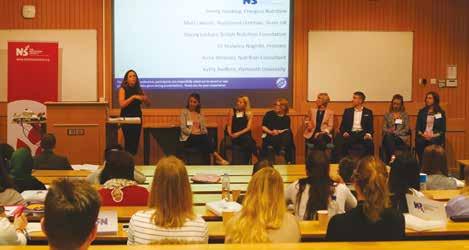
2 minute read
Student Conference 2017
The Student Conference, now in its second year, provides a unique opportunity for students of all levels to come together to learn and share ideas. This year’s Student Conference held on 8 and 9 September at the University of Reading continued this concept with a focus on nutritional science and transferrable skills.

Over 100 delegates attended across the two days taking part in nine Oral Communication sessions, 36 lightning sessions (pithy three minute slots for students to summarise their research projects) and 10 Nutrition Society Summer Studentship presentations. This combined with CV workshops, career panel discussions and plenty of networking, made for an energetic, thought-provoking conference.
There was strong support from senior academics, with Nutrition Society President, Professor Philip Calder opening the conference. Professor Julie Lovegrove, Hugh Sinclair Chair in Human Nutrition, University of Reading, gave an edifying keynote lecture on fats and heart disease. Setting the scene, Professor Lovegrove discussed global levels of heart disease and the rapid increase in low and middle income countries, before considering the role of dietary fats in cardiovascular disease.
Our President took centre stage again to give the first plenary lecture on nutrition and ageing. After highlighting the growing interest in ageing due to increased life expectancy, Professor Calder discussed immunity through the lifecycle and the role of inflammation. Professor Bob Rastall, University of Reading, presented a nutrition science hot topic, the gut microbiome, considering composition changes through pre and probiotics as well as vitamins and polyphenols, highlighting the challenges of measuring benefits on host health.
Original Communications took place on the first day, covering a broad range of nutrition science topics; from the first nutrigenetic study in an Asian Sri Lankan population, to the most efficient method of making insect powder for human consumption, to analysing the efficiency of using the PaperWeight Armband in screening for malnutrition in older adults. Once the presentations were finished on day one, students could relax at the informal mixer held at ZeroDegrees in Reading. With Giant Jenga bringing together students from universities across the UK, conversations bounced between nutrition, blogging and reflections of the conference talks earlier that day.
The emphasis shifted on day two with greater focus on career development and transferrable skills. Honorary Training and Education Officer, Penny Hunking, opened the day with informative insights into being a Freelance Dietitian and Nutritionist. With a vast amount of experience, Penny had lots of valuable advice for those thinking about freelance careers including, find a professional identity which is marketable, be bold and create work opportunities, keep your knowledge up to date through CPD and, networking is key.
Career panels played a key role in the developmental focus of the conference with representatives from across the nutrition community discussing a range of career options available to graduates. A second panel of experts gave tips on CV writing, interview preparation and how to sell yourself with key take home messages to: focus on your strengths; always ask for feedback; and be aware of the information you have on social media, a prospective employer could search for you. Supporting the sessions were five CV clinics held during the breaks giving students the opportunity to receive feedback on their current CV from Dr Danielle McCarthy, a Registered Nutritionist, and Anna Wheeler, Nutrition Freelance Consultant, both with over 15 years’ experience working within the food industry.
The Society is most grateful to the Student Section Chair, Dr Malwina Naghibi, the Student Section, and the local organisers, led by Dr Vimal Karani, for their tireless efforts in making the second Student Conference a success.



